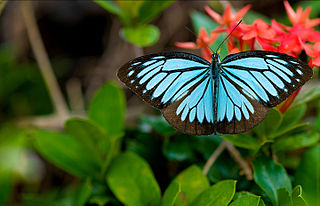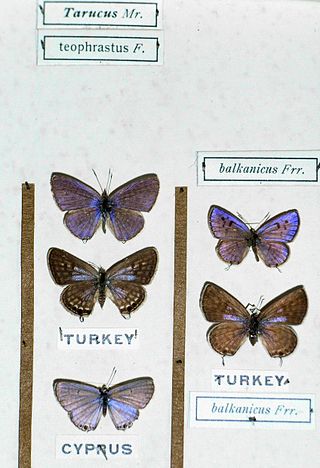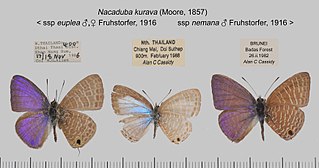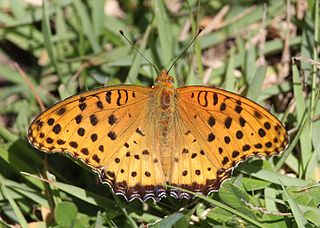
Ariadne merione, the common castor, is an orange butterfly with brown lines whose larvae feed almost exclusively on castor. It is similar in appearance to Ariadne ariadne, the angled castor.

Pareronia valeria, the common wanderer or Malayan wanderer, is a medium-sized butterfly of the family Pieridae, that is, the yellows and whites, and is found in India and Southeast Asia. The butterfly found in India is sometimes considered as a separate species, Pareronia hippia.

Graphium eurypylus, the great jay or pale green triangle, is a species of tropical butterfly belonging to the family Papilionidae.

Parthenos sylvia, the clipper, is a species of nymphalid butterfly found in south and southeast Asia, mostly in forested areas. The clipper is a fast-flying butterfly and has a habit of flying with its wings flapping stiffly between the horizontal position and a few degrees below the horizontal. It may glide between spurts of flapping.

Appias libythea, the striped albatross, is a small butterfly of the family Pieridae, that is, the yellows and whites, which is found in south and southeast Asia.

Castalius rosimon, the common Pierrot, is a small butterfly found in India that belongs to the lycaenids, or blues family.

Miletus symethus, the great brownie, is a small butterfly found in India that belongs to the lycaenids or blues family. The species was first described by Pieter Cramer in 1777.

Tarucus theophrastus, the common tiger blue, pointed Pierrot or African Pierrot, is a small butterfly found in the Old World tropics. It belongs to the lycaenids or blues family.

Idea is a genus of butterflies known as tree nymphs or paper butterflies. The member species are concentrated around South-East Asia. See Sevenia for the genus of African tree nymphs. These slender butterflies have very large, papery white wings with black veins and markings. They stay high up in the treetops where they flap around in slow flight. Like most other monarch butterflies, wood nymphs are poisonous, and the striking colour patterns signal this. Several butterflies from other groups mimic these patterns.

Celaenorrhinus is a genus of skipper butterflies which are commonly termed sprites. An alternate name is flats, for their habit of holding their wings flat when resting, but this is also used for related genera. They are the type genus of tribe Celaenorrhinini.

Nacaduba kurava, the transparent six-line blue, is a species of butterfly in the family Lycaenidae found in Asia and Australia. The species was first described by Frederic Moore in 1857.

Hypermnestra helios is a species of swallowtail butterfly belonging to the Parnassinae family and is the sole member of the genus Hypermnestra. It is found in Iran, Afghanistan, Pakistan, Turkmenistan, Kirghizstan, Tajikistan, and Uzbekistan. It is locally common in desert habitats.

The Indian fritillary is a species of butterfly of the nymphalid or brush-footed family. It is usually found from south and southeast Asia to Australia.

Neptis nata, the clear sailer or dirty sailer, is a species of nymphalid butterfly found in south and southeast Asia.

Neptis clinia, the southern sullied sailer or clear sailer, is a species of nymphalid butterfly found in South Asia and Southeast Asia.

Byblia ilithyia, the spotted joker or joker, is a species of nymphalid butterfly found in parts of Africa and Asia.

Grammodes stolida, the geometrician, is a moth of the family Erebidae. The species was first described by Johan Christian Fabricius in 1775. It is found in Africa, southern Europe, most of Asia and Australia. It migrates to central and northern Europe as far north as England, Denmark and Finland.

Papilio tydeus is a species of swallowtail butterfly from the genus Papilio that is found in the Moluccas.

Chersonesia intermedia, the intermediate maplet, is an Indomalayan butterfly of the family Nymphalidae (Cyrestinae). It is found from Assam to Peninsular Malaya then to Sumatra and Borneo. It is very similar to Chersonesia risa
Chersonesia niceville is an Indomalayan butterfly in the family Nymphalidae (Cyrestinae). It is found in Sumatra and Peninsular Malaysia.


















